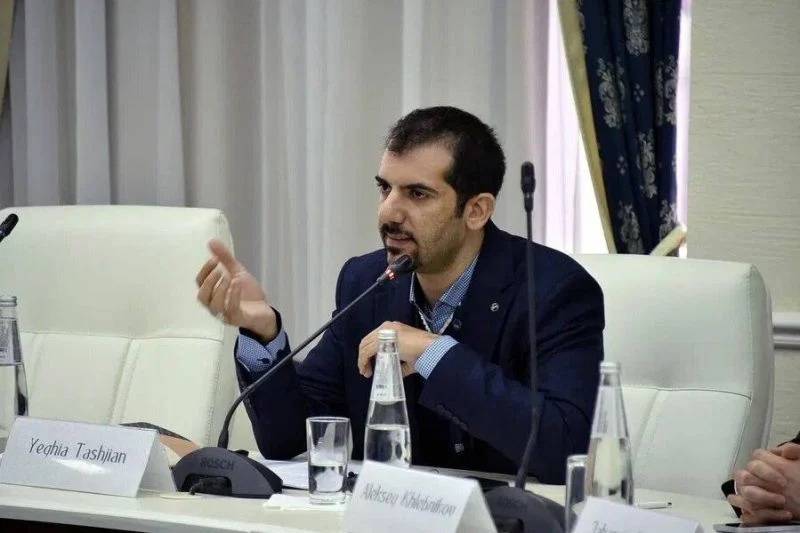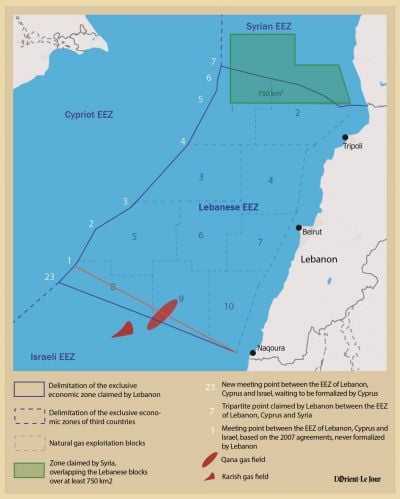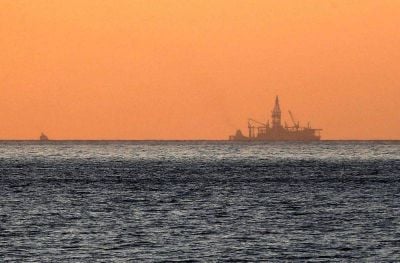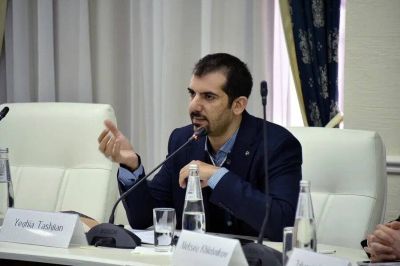
Yeghia Tashjian speaks at a conference in Russia. (Courtesy of: Yeghia Tashjian)
In late February, Lebanon officially condemned Russia’s invasion of Ukraine and, in October, opposed Russia’s annexation of the occupied Ukrainian regions. Yet Russian-Lebanese diplomatic ties have continued.
In December, Russian airline Aeroflot resumed flights to Beirut and the country continued to donate wheat and fuel to Lebanon. How does one explain this paradox?
At the beginning of the Russian-Ukrainian conflict, when the Lebanese Foreign Affairs Ministry condemned the Russian invasion of Ukraine, Russia was surprised, expecting a more neutral position from Lebanon — especially considering its humanitarian aid after the terrible explosion on Aug. 4, 2020.
In reality, and in addition to obvious American pressure, Lebanon showed solidarity with Ukraine given its dependence on cereal imports from this country and the consequences that this conflict was going to have — and which have come to fruition — on Ukrainian exports and the price of raw materials.
Nevertheless, whether it is Aeroflot’s return or the donation of raw materials to Lebanon, Russia is seeking to make a comeback on the Lebanese economic, political and diplomatic scene by activating its soft power, simply because it considers Lebanon as an extension of its geopolitical depth in Syria.
To do so, it needs Lebanon to be and remain stable because its stability influences that of its neighbor. It is therefore necessary for Russia to have a presence in Lebanon which, if it cannot be in a military form as in Syria, must at least be commercial. Discussions are underway in Russia to strengthen exports of raw materials, such as input goods, to Lebanon.
Caretaker Public Works Minister Ali Hamieh recently announced that he had mentioned the negotiations over maritime border demarcation between Lebanon, Cyprus and Syria to the Russian ambassador to Lebanon, Alexander Rudakov.
What role does Russia intend to play in this matter, after Russian company Novatek recently withdrew from the consortium established with France’s TotalEnergies and Italy’s Eni, during the talks for the maritime border demarcation deal that was signed between Israel and Lebanon at the end of October?
Novatek’s withdrawal is undoubtedly linked to the American pressure on this issue, [as Washington] oversaw [the talks] from A to Z and about which the Russians could do nothing.
But if the Americans have the upper hand in South Lebanon, they do not have it in North Lebanon. This is why the Russian presence is particularly evident in Tripoli, where it is particularly involved given the city’s proximity to Syria.
Moreover, Russia shares its influence there with Turkey, a country with which it can easily cooperate given their common interests in northern Lebanon and Syria.
The success of a maritime agreement between Lebanon, Cyprus and Syria — in which Russia could play the role of mediator and facilitator — would allow it to establish a certain balance with the US — each having won a round at this level and strengthened its strategic position in the Mediterranean.
The signing of such an agreement will boost Russian diplomacy in the region and, in a very concrete way, could later lead Russia to transit through the port of Tripoli when the reconstruction of Syria is on the agenda.
Ostracized by much of the West following the outbreak of war in Ukraine, Russia is turning its attention to Africa, Asia and the Middle East. How much can it influence what happens in the region and in Lebanon?
While Russia and Iran have a certain level of rivalry on Syrian territory, it goes without saying that the two countries have good relations on other grounds.
But this is not Russia’s only “friendly” country in the region — on the contrary. This was recently confirmed at the meeting of OPEC+ oil producers in October, when Russia and Saudi Arabia agreed to cut daily barrel production, thereby inflicting a blow to the US and Western countries.
A new alignment between these two powers could also be emulated in Lebanon, particularly with regard to the presidential election. In fact, although it does not have a favorite candidate, Russia is leaning toward Sleiman Frangieh, who is close to the Syrian regime.
The latter was, in fact, in Moscow in April, where he met Russian Foreign Minister Sergey Lavrov.
In any case, the Russians will do their best to push for the election of a Lebanese president with whom they have good relations. In order to do this, Russia could align itself with Saudi Arabia. I think that the next few weeks will confirm or reject this alignment.
This interview was originally published in French in L’Orient-Le Jour.


